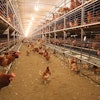It's something that we should all do all the time, but one of those things that, too often, we let slip.
At the IFF Feed Processing Conference, held as part of Victam 2011, Richard Oldman of Anitox, looked at a topic that is important to each and every one of us and that, in a time of rising input costs, is particularly relevant to the feed industry.
So how can good housekeeping really help? Well, while new and more efficient technology can usually be introduced to most processes, saving energy always makes sense. Looking particularly at energy demands in the pelleting of feed, he noted that saving energy was essential.
So where to start? Amongst his observations were that equipment is often left running, there can be build ups of old material, mixers may not properly be emptying, there may be badly worn padders, holes may be half blocked, knifes blunt, and the cooler air flow incorrect. If not enough attention is paid to these, and other, areas, then energy is wasted. Just like the build up of scale in a kettle or an accumulation of lint and dust in a vacuum cleaner in our own homes, failure to attend to simple things reduces efficiency and increases costs.
Mr Oldman noted that, as far as steam is concerned, he has often seen that pipework is undersized, traps may not be working properly, and an absence of gauges for pressure and temperature.
He also pointed to trials that were carried out in 2009 at the IFF Research Institute of Feed Technology Braunschweig, Germany, that responded to the question of whether pelleting aids can solve problems. Broiler, dairy and pig feeds were trialled and, across all three feed types, there were savings in electrical power. Although increased throughput could not be demonstrated, electrical savings could be.
Amongst reasons for this were improved conditioning rates by increased thermal acceptance of the pellet press by thorough heating of the meal particles rather than simply surface heating.
Mr Oldman notes that there are many mills where energy consumption is much higher than it needs to be.
Writing from the Victam showfloor, I an wondering whether I left the television on standby, when was the last time I descaled the kettle or gave the vacuum cleaner a thorough overhaul? I need to save electricity!
At the IFF Feed Processing Conference, held as part of Victam 2011, Richard Oldman of Anitox, looked at a topic that is important to each and every one of us and that, in a time of rising input costs, is particularly relevant to the feed industry.
So how can good housekeeping really help? Well, while new and more efficient technology can usually be introduced to most processes, saving energy always makes sense. Looking particularly at energy demands in the pelleting of feed, he noted that saving energy was essential.
So where to start? Amongst his observations were that equipment is often left running, there can be build ups of old material, mixers may not properly be emptying, there may be badly worn padders, holes may be half blocked, knifes blunt, and the cooler air flow incorrect. If not enough attention is paid to these, and other, areas, then energy is wasted. Just like the build up of scale in a kettle or an accumulation of lint and dust in a vacuum cleaner in our own homes, failure to attend to simple things reduces efficiency and increases costs.
Mr Oldman noted that, as far as steam is concerned, he has often seen that pipework is undersized, traps may not be working properly, and an absence of gauges for pressure and temperature.
He also pointed to trials that were carried out in 2009 at the IFF Research Institute of Feed Technology Braunschweig, Germany, that responded to the question of whether pelleting aids can solve problems. Broiler, dairy and pig feeds were trialled and, across all three feed types, there were savings in electrical power. Although increased throughput could not be demonstrated, electrical savings could be.
Amongst reasons for this were improved conditioning rates by increased thermal acceptance of the pellet press by thorough heating of the meal particles rather than simply surface heating.
Mr Oldman notes that there are many mills where energy consumption is much higher than it needs to be.
Writing from the Victam showfloor, I an wondering whether I left the television on standby, when was the last time I descaled the kettle or gave the vacuum cleaner a thorough overhaul? I need to save electricity!















